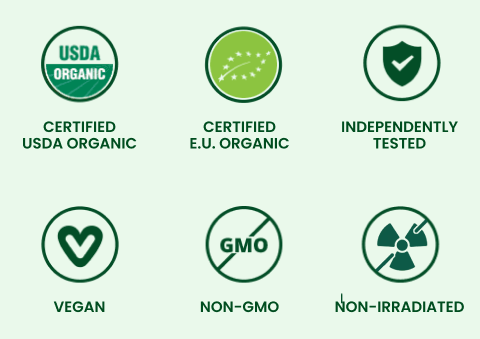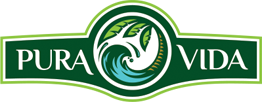The Science-Backed Benefits of Moringa for Breastfeeding Moms
Talk to any breastfeeding mother and their number 1 worry is likely, "Am I making enough milk for my baby?" While true low supply is very rare, most nursing mother's could benefit from a little boost to their milk supply, especially during those long nights of cluster feeding. The snag? Google, "natural ways to boost milk supply" and you're inundated with so-called natural solutions. From fenugreek to chamomile tea and eating your body weight in oreos, there's no shortage of advice. The problem lies in that many of these recommendations have no scientific backing and the "evidence" is purely anecdotal. If you're looking for a no nonsense, tried and tested way to increase breast milk production, moringa is that girl! Let's take a look at exactly what this ancient galactogogue can do for your breastfeeding journey.
What is Moringa?
Moringa leaf comes from the incredible Moringa oleifera tree - often called the "Miracle Tree" or "Tree of Life" – and for very good reason as you're about to see! This remarkable plant is native to regions of South Asia and Africa, and has been used in these communities for centuries in traditional medicine and to enhance nutrition. Beyond its widespread use as a highly nourishing food source, moringa has also been used as a powerful breastfeeding tonic, a secret passed down through generations of moms. While historically, the leaves were dried and brewed in teas, today it comes in many convenient formulations, including in moringa capsules. This makes it quick and easy for moms to grab their moringa supplements on the go and get the correct dose, no guesswork necessary.

The Science Behind Moringa as a Galactagogue
Moringa is considered to be one of the most powerful galactogogues, meaning it helps to increase breast milk production. It is thought to work on increasing the hormone prolactin, which is responsible for coordinating milk production. The more prolactin your pituitary gland makes, the more milk you make! That means moringa will be especially beneficial for mother's whose underlying issue to their low milk supply is low or sub-optimal prolactin levels.
Moringa's has also been found to lower blood sugar which can indirectly support milk production. Elevated or uncontrolled blood sugar levels, often associated with conditions like gestational diabetes or insulin resistance, can sometimes negatively impact milk production. When blood sugar is well-managed, the body's metabolic processes, including the complex hormonal pathways involved in lactation, tend to function more optimally.
A study conducted in 2022 showed that mother's in the group who took moringa supplements enjoyed a volume of around 47% more milk than those in the control group. When you think that on average most women produce around 24oz a day, a 47% increase on that number is very significant! Imagine what you could do with all that extra milk - hello freezer stash!
Benefits of Moringa for Breastfeeding
Moringa doesn't just increase your milk supply by raising your prolactin levels - it does some other really neat stuff too!
Increases Nutrition in Breast Milk
Moringa is a nutrient-rich supplement in and of itself, so adding it to your diet while breastfeeding can improve the composition of your milk. Studies have shown that moringa can help you make gold-star milk for your baby that is rich in vitamin A and has a better ratio of fat, protein and carbohydrates than in moms not supplementing with moringa.
Source of Iron, Calcium and Vitamin K
Moringa is rich in essential nutrients, one of which is iron. Optimal iron levels are essential for healthy milk production because blood is the building block of milk! Pregnancy and birth can deplete your iron stores so taking a naturally iron-rich supplement postpartum can help return your iron levels to a normal range. Calcium is also important for breastfeeding moms to pay attention to because your baby will need adequate amounts in your milk to grow strong bones.
Aids Digestion
Moringa is high in fiber, which is a big help for both mom and baby if constipation is a worry. In addition to this, it's nutrient profile also encourages the growth of gut-friendly bacteria to improve your gut health overall (and your baby's!).
Boosts Energy
As a new mom to a baby who constantly needs you and is probably keeping you up at night, an energy boost is much needed. Packed with nutrients and antioxidants, moringa capsules can help you feel more alert and awake, better able to meet the needs of your babe.

Moringa vs. Other "Solutions"
Some common galactogogues you might see purported online include fenugreek, blessed thistle and goats rue. While many do have their place and can be helpful when combined with a powerhouse like moringa, there's a reason why moringa is a preferred supplement!
Unlike similar herbs, moringa provides a vast array of nutrients that benefit both you and your baby, improving the quality of breastmilk. Fenugreek, alfalfa and goats rue can alter the taste of breastmilk, which some babies may not like. They can also cause digestive upset and gas in both mom and baby. Mom's taking moringa don't experience these issues.
Moringa also tends to work quickly and produce fast results for moms, compared to other supplements which can take weeks to start showing results. Many moms report a noticeable increase in milk production within 24 hours - handy when you're under pressure to make more milk to meet the needs of a hungry baby!
How to Take Moringa While Breastfeeding
Moringa is available in many different forms including moringa powder, moringa capsules, oil and moringa drops. Which one you prefer to take depends on your lifestyle but we find most moms prefer capsule form because they're quick and easy on the go.
Studies have shown an effective dose to increase milk supply ranges from 3 to 9 grams per day in capsule or powder form. So for a 500mg capsule, this may look like 1 to 2 capsules up to 6 times a day. For liquid extracts, the guidelines recommend 3 to 6 ml per day. You should generally start at the lowest dose and titre up as needed to achieve the desired results.
Remember, no supplement replaces effective milk removal so ensure you are nursing or pumping 8 to 12 times per day. It is also important to stay hydrated by drinking lots of water throughout the day.
The Takeaway
Moringa is a powerful ally for mothers looking to increase breastmilk production. Whether you simply want to make enough to meet the demands of your baby, want to build a freezer stash or wish to donate surplus milk, moringa can give you the boost you need.
FAQs
Q: Is moringa better than feugreek for breastfeeding?
A: When comparing moringa and fenugreek for breastfeeding, it's not as simple as one being "better" for every mother, as individual responses to galactagogues can vary. However, moringa often emerges as a more favorable option for many breastfeeding mothers due to its nutritional profile and fewer reported side effects. Fenugreek can cause some mother's milk production to slow down or even dry up their milk, so it can be a risky herb to try, especially if you're already dealing with a low supply.
Here's a breakdown of why moringa is often preferred over fenugreek:
- Nutritional Powerhouse: Moringa is packed with essential vitamins (A, C, E, K, B vitamins), minerals (iron, calcium, magnesium, potassium), amino acids, and antioxidants. These nutrients not only potentially help increase milk supply but also support the overall health and energy levels of nursing moms.
- Easy on the gut: Fenugreek is known to cause gas and digestive upset in moms and babies, whereas moringa can actually aid digestion and improve discomfort.
- No "Maple Syrup" Smell: A very common and often off-putting side effect of fenugreek is that it can cause your sweat, urine, and even breast milk to smell like maple syrup. This doesn't happen with moringa.
- Potential for Broader Health Benefits: Beyond lactation, moringa's antioxidant and anti-inflammatory properties offer general wellness benefits such as supporting blood sugar regulation, energy levels, and immune function.
Q: How quickly does moringa increase milk supply?
A: Many mothers report seeing an increase in milk supply with moringa within 3 to 7 days of consistent use, with some noticing effects as early as 24-48 hours. Full benefits may become apparent within one to two weeks. Individual results can vary, and it works best alongside frequent nursing/pumping and good hydration.
Q: How to take moringa for breastfeeding?
A: For breastfeeding, moringa is commonly taken as powder (3-9 grams daily, mixed into oatmeal or smoothies), moringa capsules (1-2 capsules, 2-3 times daily, 500mg each), or liquid drops/extract (follow product directions).
Q: What is the best moringa for breastfeeding?
A: Pura Vida Moringa Powder and Pura Vida Moringa Capsules are excellent choices, being 100% USDA certified organic.
- Pura Vida Moringa Capsules are convenient and offer precise dosing. They are easy to take on the go, mask the earthy taste of moringa, and provide a consistent amount of the supplement with each capsule.
- Pura Vida Moringa Powder offers versatility. It can be easily added to smoothies, juices, yogurts, or even savory dishes, allowing for more flexibility in incorporating it into your diet and potentially higher dosages if desired for very low supply.
Both forms deliver the vital nutrients and galactagogue properties of moringa to support milk production and maternal health. Choose the one that best fits your lifestyle to ensure consistency.
Q: How much moringa to increase milk supply?
A: Moringa is most commonly available for lactation support in the form of capsules and powder.
-
Capsules: Many commercially available moringa supplements suggest a higher dosage, often around 3,000 mg (3 grams) per day. This is typically taken as two 500 mg capsules three times daily with meals.
- Powder: A common recommendation is to start with a small amount, such as 1/4 to 1/2 teaspoon per day, and gradually increase. Some experts suggest a total daily intake of 3 to 9 grams of the powder.


